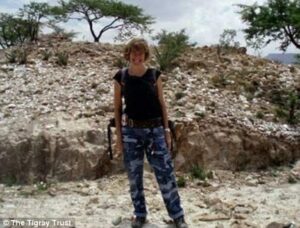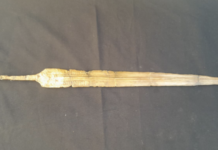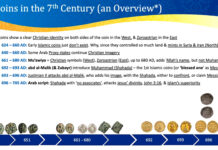By Damien Gayle

British archaeologists have struck gold with a discovery that may solve the mystery of where the Queen of Sheba unearthed her fabled treasures.
According to the Bible, the ruler of Sheba, which spanned modern-day Ethiopa and Yemen, travelled to King Solomon in Jerusalem, bringing 120 talents (four-and-half tons) of gold.
Now an ancient goldmine, together with the ruins of a temple, has been found on the high Gheralta plateau in northern Ethiopia, part of the Queen’s former territory.
The entrance lay concealed behind a 20ft stone or slab carved with a sun and crescent moon, the ‘calling card of the land of Sheba’, according to excavation leader Louise Schofield.
Ms Schofield told the Observer: ‘I crawled beneath the stone – wary of a 9ft cobra I was warned lives here – and came face to face with an inscription in Sabaean, the language that the Queen of Sheba would have spoken’
Nearby she found parts of columns and finely carved stone channels from a buried temple believed to be dedicated to a moon deity.
Excavations also revealed the site of a battlefield nearby, where Ms Schofield discovered ancient bones.
Local people still pan for gold in a nearby river, but they were unaware of the ancient mine complex beneath their feet.
The shaft is buried 4ft beneath the surface of a hill circled by vultures. An ancient skull is embedded above the entrance, which bears Sabaean chiseling.
Sheba was an 8th century BC civilisation that lasted a milennium, prospering through trade in incense spices with Jerusalem and the Roman empire.
Its legendary Queen is chronicled in both the Koran and the Bible, which describes her visiting Solomon ‘with a very great retinue, with camels bearing spices, and very much gold and precious stones’.
The Biblical account says the Queen was ‘overwhelmed’ by Solomon’s wisdom and the happiness of his kingdom and, as she departed, ‘she gave the king 120 talents of gold’ – equal to about four-and-a-half tons.
Although it is not mentioned in the Bible, legend has it that Solomon also wooed the Queen and that descendants of their child, Menelik, became the kings of Abyssinia.
Ms Schofield told the Observer she will start a full excavation at of the mines once she has secured the funds.
She said: ‘One of the things I’ve always loved about archaeology is the way it can tie up with legends and myths.
‘The fact that we might have the Queen of Sheba’s mines is extraordinary.’ –Daily Mail



